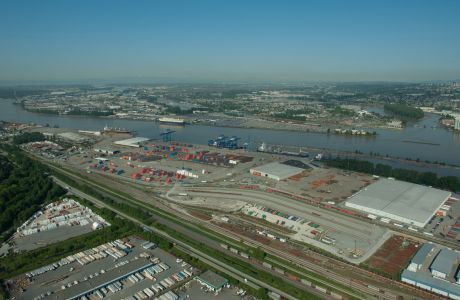Report on Business
You are here
Hundreds oppose new coal terminal and one CEO supports it

June 10, 2013
Nearly 250 residents, four New Westminster city council members, two NDP MPs and one NDP MLA attended a town hall meeting on May 30 about the Fraser Surrey Docks (FSD) proposal for a direct (thermal) coal transfer facility at its site on the City of Surrey side of the Fraser River. The terminal is directly opposite to the New Westminster Quay and Queensborough neighbourhoods, both high density residential areas on the banks of the Fraser River, one of the world’s most endangered rivers.
This town hall marked the first time representatives had gathered to discuss potential effects to the community related to coal port expansions, and was held just after New Westminster city council announced its opposition to the coal shipping proposal. The majority of both speakers and attendees voiced their opposition to FSD expansion.
After expansion plans are complete, FSD expects to transfer up to four million tonnes of thermal bituminous coal each year; at present no coal is exported from the terminal. This coal will be transported from mines in the Powder River Basin of Montana and Wyoming by the BNSF railway to FSD, then loaded on to barges and shipped to Texada Island where it will be transferred to primarily Asian markets.
According to Jeff Scott, the terminal’s CEO, “coal is a safe product that can be transported safely with no impact to the community. We believe that this project addresses the concerns of our neighbours and residents of New Westminster, and delivers the environmental standards that we all expect and deserve.”
This reflects the narrow view of the business community involved in the transfer of coal. While Scott may be correct about the safety of the measures to be employed by FSD, there is a host of other potentially harmful effects that it cannot mitigate. Port Metro Vancouver is the federal authority that will approve the FSA expansion. Its mandate is only concerned with the direct impacts of its own facilities on the local environment and community, and not the impacts of the coal globally in the context of climate change or issues that arise from the coal’s transfer to and from the facility.
Speaking on behalf of the Chief Medical Health Officer under the Public Health Act, Dr Paul Van Buynder shared his thoughts. “I believe jobs are good…conversely, I believe the regular inhalation of coal dust is not good.” Van Buynder went on to explain that overall, as Chief Medical Health Officer, he does not know enough about the proposal to say that it is a great idea. For him, there is not enough data about dust movement at FSD and en route to and from the docks, the modeling on particulates and NOx emissions needs improving, and a comprehensive health impact assessment is needed.
Andrew Murray of New West Enviro Partners and long-time city resident was the evening’s voice for the global effects of mining, shipping and burning coal. Murray stated, “We’re not against jobs. We want Fraser Surrey Docks to be successful. We just want them to sell a different commodity.” The coal that could be shipped through New Westminster originates in the Powder River Basin of Montana and Wyoming, and has been rejected for transfer by Washington and Oregon state. Powder River Basin thermal coal is of the lowest grade so it sells at the lowest price. Very little energy is derived from its burning but it still emits the same amounts of carbon dioxide. Said Murray, “Profit margins are taking precedence over quality of life.”
Comments from Metro Vancouver Air Quality Policy and Management Manager Roger Quan supported those of Van Buynder and Murray. Quan cited two issues with FSD’s application: not all sources of fugitive dust had been accounted for, and there was no assessment of coal dust and exhaust emissions during transit to and from FSD. Metro Vancouver will follow up with FSD on these issues, but as Quan admitted sources of coal dust, diesel emissions and other sources of air pollution are not within their permitting jurisdiction; Port Metro Vancouver, Transport Canada and Environment Canada will all be issuing permits related to FSD’s expansion into coal export.
During question period, local residents stated health and climate concerns similar to those on the panel save for FSD CEO Scott. As well, a petition was presented to the panelist and government representatives with over 900 names from residents of the Queensborough area of New Westminster opposing the terminal.
While it seems that FSD has numerous measures in place to mitigate any issues from the handling of coal, it cannot control everything. Also, Port Metro Vancouver is a federal entity and the issuer of the project permit. Even if the Chief Health Officer and Metro Vancouver give recommendations or do not issue air quality permits, they have no ability to force FSD to abandon their plans.
None of the regulators are asking, should we be exporting coal to be burned at all? Murray urged those present to think about the global effects of transfer and burning coal. He related the events of last year when Marc Jaccard, SFU professor and Nobel prize winner, was arrested for blocking a coal train. Murray says that he believes Jaccard was telling us, “Here’s the line in the sand. If we cross this line we are doing irreparable harm to our children and future generations of Canadians. We are better than this.”
This project and others relating to coal and oil highlight the urgency with which we need to create a world that is not driven by the profit so that we can eliminate the use of fossil fuels. Funding green jobs and infrastructure is a crucial first step.
Section:










